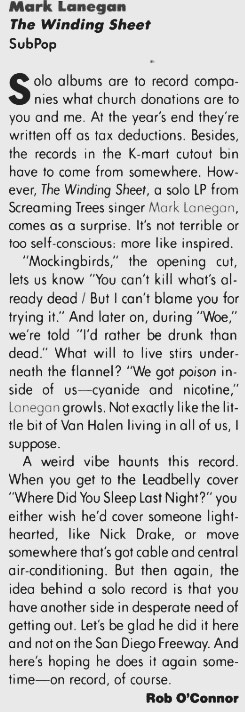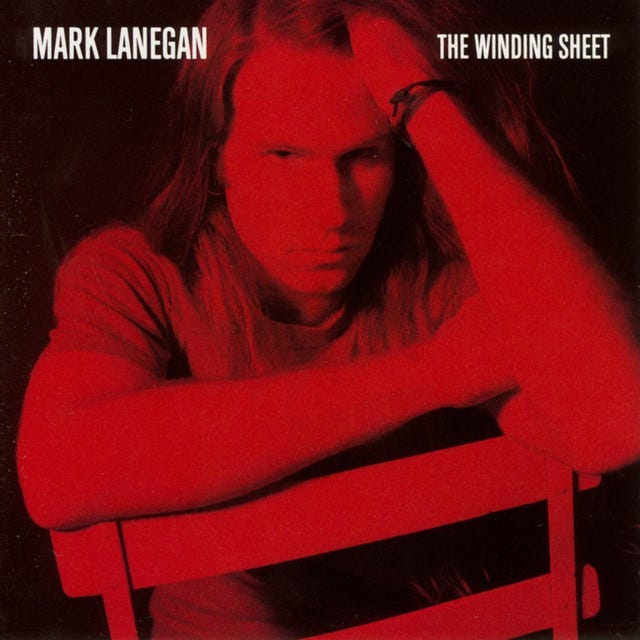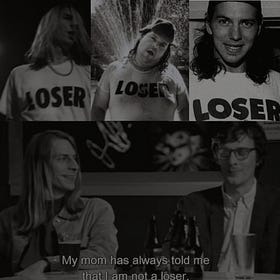Mark Lanegan: Quiet Yet Powerful Dark Tunes
''How could Kurt be a fan when I saw in him a talent that was genuinely not of this place and time, like Bob Dylan, John Lennon, David Bowie, or Jimi Hendrix? I simply had the heart of a packhorse.''
The Winding Sheet (1990)
‘‘It was impossible for me to accept that someone else could find worth in what I did because I could not. How could Kurt be a fan when I saw in him a talent that was genuinely not of this place and time, like Bob Dylan, John Lennon, David Bowie, or Jimi Hendrix? I simply had the heart of a packhorse.’’- Mark Lanegan
The Winding Sheet (1990) is Mark Lanegan’s first solo album and it’s the most important album in the development of grunge and Seattle rock music. The album is completely different than any musical work from Screaming Trees, the band he fronted from 1985 until 2000. One of the most fascinating things about this album is the fact that he had not picked up an instrument before or contributed musically to any Screaming Trees song beside lyrics. 25 years of age, working in a warehouse, the grunge icon spent his days trying to come up with melodies and lyrics for his first album. He bought a cheap and used acoustic guitar with a Mel Bay chord book and got to work.
For his first solo album, he was inspired to write, as he describes: ‘‘quiet yet powerful dark tunes’’. Particularly, taking notes from Henry Rollins and Straight Ahead (1985) by The Wipers Greg Sage. The album is full of dark acoustic, gothic folk and grunge defining songs. Opening track ‘‘Mockingbird’’ alongside piano, electric and acoustic guitars remarks : ‘‘You can't kill what's already dead, But I don't blame you for trying it’’. Heavy, blues inspired lyrics with religious references with this musical style can be heard on other Lanegan’s albums. Despite being more than 10 years apart, ‘‘Out of Nowhere’’ on Bubblegum (2004) and ‘‘Mockingbird’’ both have the distinctive style of Lanegan- dark acoustic open chords and guitars accompanied with glassy, clean piano. And of course, Lanegan’s baritone voice.
The musical style of The Winding Sheet is also reminiscent of Nirvana’s acoustic based songs and performances. Thematically, the album also explores longing, loneliness, sickness and pain. Even suicide, if ‘‘Undertow’’ is considered. The song opens with : ‘‘Water will forgive me, I'm just tryin' to forget, Starin' at the water as the waves turn ruby red…Water will accept me, give me a peace I've never seen…Water will forgive me for everything I never should, Water will accept me for all the things I never could’’.
Moreover, the album title references the cloth in which a body is wrapped for burial. All of these mentioned themes are characteristic of grunge music for example Soundgarden’s ‘‘The Day I Tried To live’’, Pearl Jam ‘‘Immortality’’ or Alice in Chains ‘‘Down In a Hole’’. or ‘‘Them Bones’’. Other songs on the album follow the same tangent. ‘‘The Winding Sheet’’ Lanegan sings: ‘‘Saw a ghost in the shadows smile, I was sick in my soul’’. Whilst on ‘‘Ugly Sunday’’ he asks, ‘‘Why if I'm so alone now, Is it getting hard, to say goodbye now’’.
‘‘I feel your blood run cold
And it's a rainy Sunday morning
I count the million miles I'm driftin'
From here, to hell
TodayBehind their windows people stare
Can't recognize the kindness there
Just prayers for drownin' ships at sea
None for me
And you’’
On ‘‘Down In The Dark’’ Lanegan sings : ‘‘I don't have very long, I think my blood might boil, And then my veins might burn, You're gonna make it better for a little while’’. And if you listen carefully, you will hear Kurt Cobain singing on ‘‘Down In The Dark’’. Whilst, Cobain plays guitar and Krist Novoselic plays bass on ‘‘Where Did You Sleep Last Night’’.
A year later, another grunge collab happened between Soundgarden’s Chris Cornell and Screaming Trees. If you listen to Screaming Trees Uncle Anasthesia (1991) you will hear Chris Cornell providing back vocals on "Alice Said," "Uncle Anesthesia," "Before We Arise" and he also co-produced this album.
Also, Cornell, Lanegan alongside Alice in Chains’ Layne Staley and Pearl Jam’s Mike McCready formed the grunge supergroup Mad Season in 1994. Once again, the result of this project - an album full of songs which explore addiction, depression, sickness and personal struggles. Interestingly, "River of Deceit" was inspired by Khalil Gibran's The Prophet - each chapter describes teaching and themes of love, family, work and death. Lanegan sings with Layne Staley on ‘‘Long Gone Day’’ - a song drifting away from rock and punk to jazz territory. And again, just like Lanagen’s solo album, mentions blood and connection to God.
‘‘So much blood, I'm starting to drown
Runs from cold to colder
Time to time the sky's come down
To help me lose my wayTears and lies for answers
You and open veins
God knows I'm gone’’‘‘I fear again, like then, I've lost my way
And shout to God to bring my sunny day’’
When it comes to Nirvana’s repertoire, Lanegan co-wrote lyrics with Kurt Cobain for ‘‘Something In the Way’’. He was not credited and in his memoir reveals he regretted not taking credit. But for sure, you can hear Lanegan’s influence on the famous Nirvana song.
Nirvana And The Photo Bruce Pavitt Had Become Enamored With
Lanegan was so impactful, that The Winding Sheet is the album that inspired Nirvana's MTV Unplugged performance (and Nirvana covered ‘‘Where Did You Sleep Last Night’’ because of Lanegan’s cover). Even, Dave Grohl expressed that it is one of the greatest albums ever. For Grohl, this album was on heavy rotation and the perfect soundtrack for winters in Olympia:
"I remember listening to his solo album, The Winding Sheet, over and over again, when I was living in Olympia. It was winter, when the sun wouldn't come up until 8am, and would go down by 2 or 3pm - it was like a rainy Scandinavia, it was fucking depressing. And that album was the perfect soundtrack for that season.’’(FooArchive, n.d)
Likewise, Kurt Cobain was a fan of Mark Lanegan. Actually, all of Nirvana. Alongside, Krist Novoselic, and Mark Pickerel both formed The Jury. In August 1989, the band rehearsed at the Seattle practice space Nirvana had rented above the Continental Trailways bus station. The band ended up rehearsing multiple Lead Belly covers with the aim to record a full album. However, after getting together, it became an ‘‘an oddly unproductive exercise’’(Lanegan, 2020,p.49). Particularly in the sense that neither Cobain or Lanegan wanted to be in charge of the project. Whilst, he was used to being the leader in Screaming Trees he could not do the same in Cobain’s presence as he was ‘‘too awed by Kurt’s genius’’ and Kurt was ‘‘strangely reticent’’(Lanegan, 2020,p.49). Only years later Lanegan understood that Kurt didn’t take the lead out of respect for him:
’’I felt like Screaming Trees’ work was secondrate, everything dragged out or cobbled together, every unsatisfying song the result of too much toil, and I saw everything through that prism. It was impossible for me to accept that someone else could find worth in what I did because I could not. How could Kurt be a fan when I saw in him a talent that was genuinely not of this place and time, like Bob Dylan, John Lennon, David Bowie, or Jimi Hendrix? I simply had the heart of a packhorse.’’ (Lanegan, 2020,p.49-50)
Sub Pop owners Bruce Pavitt and Jonathan Poneman had shown not only an interest in The Jury but wanted Screaming Trees to make a record for Sub Pop Records. Moreover, they wanted Lanegan to create a solo record which resulted in the The Winding Sheet (1990). The singer took the three-record deal, $13,000 for the first with substantial advances for the second and third. Interestingly, when the duo learnt that Lanegan found Nirvana the best band that they had on Sub Pop, both were puzzled. Screaming Trees frontman once attended a show and ran into Poneman and Pavitt.
“When are the Trees gonna quit SST and start making records for us?”
Bruce said with a smile.
“So you came over to check out Blood Circus, huh?” Jon said. Blood Circus were the headliner.
“No.”
I’d heard their music and found it not to my liking. “Tad?” Pavitt asked.
“Tad’s cool but I’m here to see Nirvana. They are the best band you have. By far. They’re one of the best bands I’ve ever seen.”
I’ll never forget the puzzled look they gave me and then the way they looked at each other. It was as if they found it unfathomable that someone would love Nirvana. I found it unfathomable that they were unaware of what greatness they had in their hands, that they had Nirvana opening for such obviously inferior music.’’(Lanegan, 2020,p.40).
Whilst, Lanegan confesses that both were marketing geniuses and did amazing things to get Nirvana on a mainstream platform, Cobain had warned him about the duo -“Watch out, they will fuck you if they can”(Lanegan, 2020,p.53).What’s really interesting about this album is the story behind the album cover.
Lanegan in his memoir Sing Backwards and Weep (2020) explains that Pavitt had become enamoured with a portrait shot of Lanegan and had insisted for it to be used on the cover. ‘‘To my punk rock sensibilities, it screamed PRETENTIOUS. There was no way I would agree to let him use it’’ (Lanegan, 2020,p.53) Lanegan explains. He choose a different photo for the album cover under the condition that Pavitt’s insisted portrait be used for promotion. Screaming Trees went on tour and some days prior to the release of the The Winding Sheet, Lanegan received a box of albums. And oncourse, when he opened the box he saw the portrait of himself all over the album- the one Pavitt has insisted on, the photo he had sworn not to use. ‘‘I was incredulous, then livid. No one in my music career had ever fucked me like that. I could not believe he’d had the balls to do it. I couldn’t look at it without feeling humiliated and violently pissed off at the same time’’ (Lanegan, 2020,p.54) he recalls. In chapter 3, ‘‘Seduced, Fucked’’, he reveals the intensive confrontation that followed:
‘‘I walked straight into Pavitt’s office where he sat behind his desk, talking to someone on the phone. I crossed the room in a couple of long, fast strides and came directly at him, fists clenched. He dropped the phone and threw himself to the floor behind his desk, his arms up over his face.
“Mark! Wait a second! Please wait a second!”
I stood over him as he cowered on the ground, barely resisting the urge to kick him in the face. “I know you’re angry and you have every right to be! I’m sorry about the cover, I should not have done it.”
“Fucking A right, you shouldn’t have done it! We had a deal, mother‐ fucker. Who the fuck do you think you are? And who do you think you’re dealing with? Some Seattle-band pussy? Where I’m from, people end up in a ditch somewhere for shit like this. I should kick your fucking head in.”
“Please wait a minute and hear me out,” he whined. “I thought I was doing what was best for you and the record. And the label.”(Lanegan, 2020,p.54).
Time has proven that it was the right choice, don’t you think?
Reading daily exercises the brain, improves sleep and reduces stress, so why not read some more?! Check this out:
The Influence of Blue Note Records on Art Chantry
The integration of the jazz aesthetic in Art Chantry`s work carry`s the protest essence, same as the previously discussed comic illustrative style or Dadaism. Chantry`s designs reflect the Blue Note Records albums and design of Reid Miles.
‘’Loser’’ – The Hero Of The 1990s
‘’The inhumanity of art must triumph over the inhumanity of the world for the sake of the humane. Works of art attempt to solve the riddles designed by the world to devour man. The world is a sphynx, the artist is blinded Oedipus, and it is works of art of the type resembling his wise answer which plunged the sphynx into the abyss’’









Very likely my favorite album of all time. Marks death inspired my first Substack post (would love you to peek at it). Was lucky to see him around 15 times, a couple with the Screaming Trees, QSA, gutter Twins, but mostly solo. Every note was perfection every single time.
His memoir is so good. It's better than binging watching a show on Netflix.